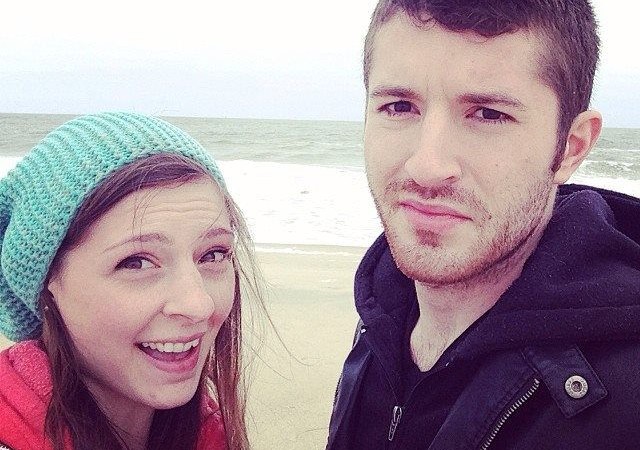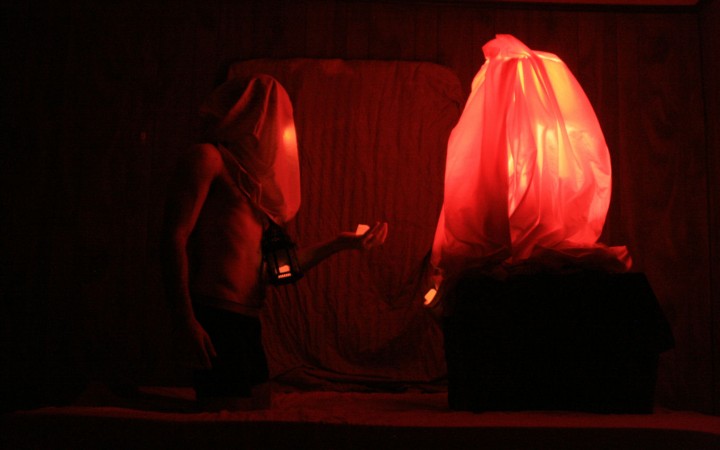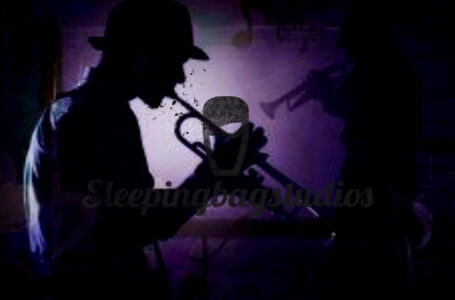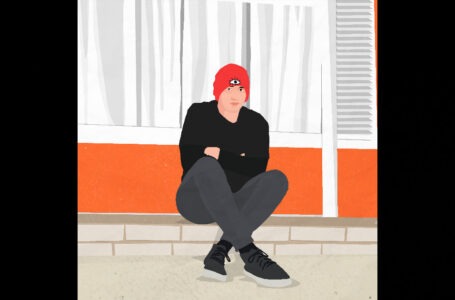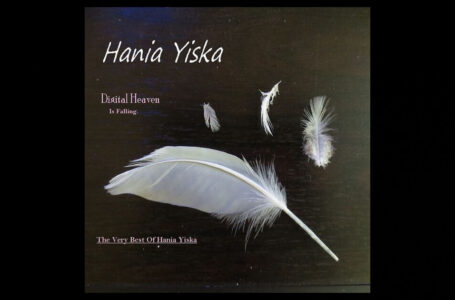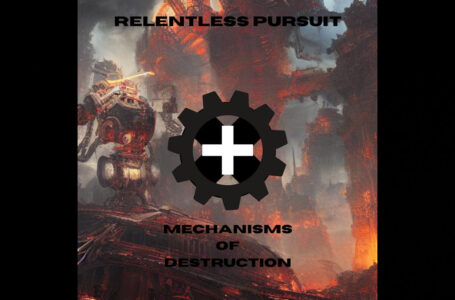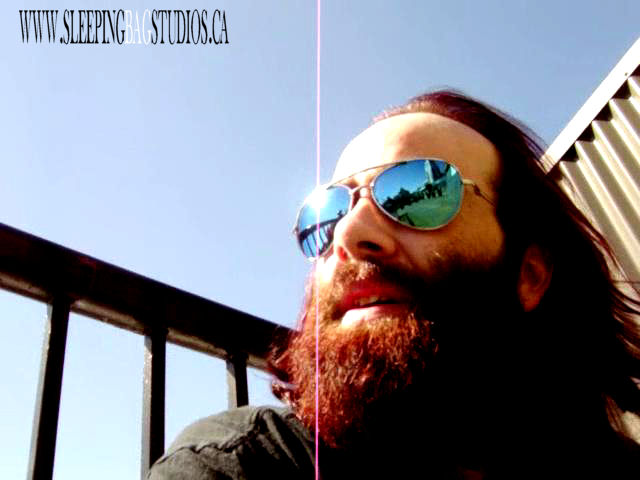The Last Surrealist
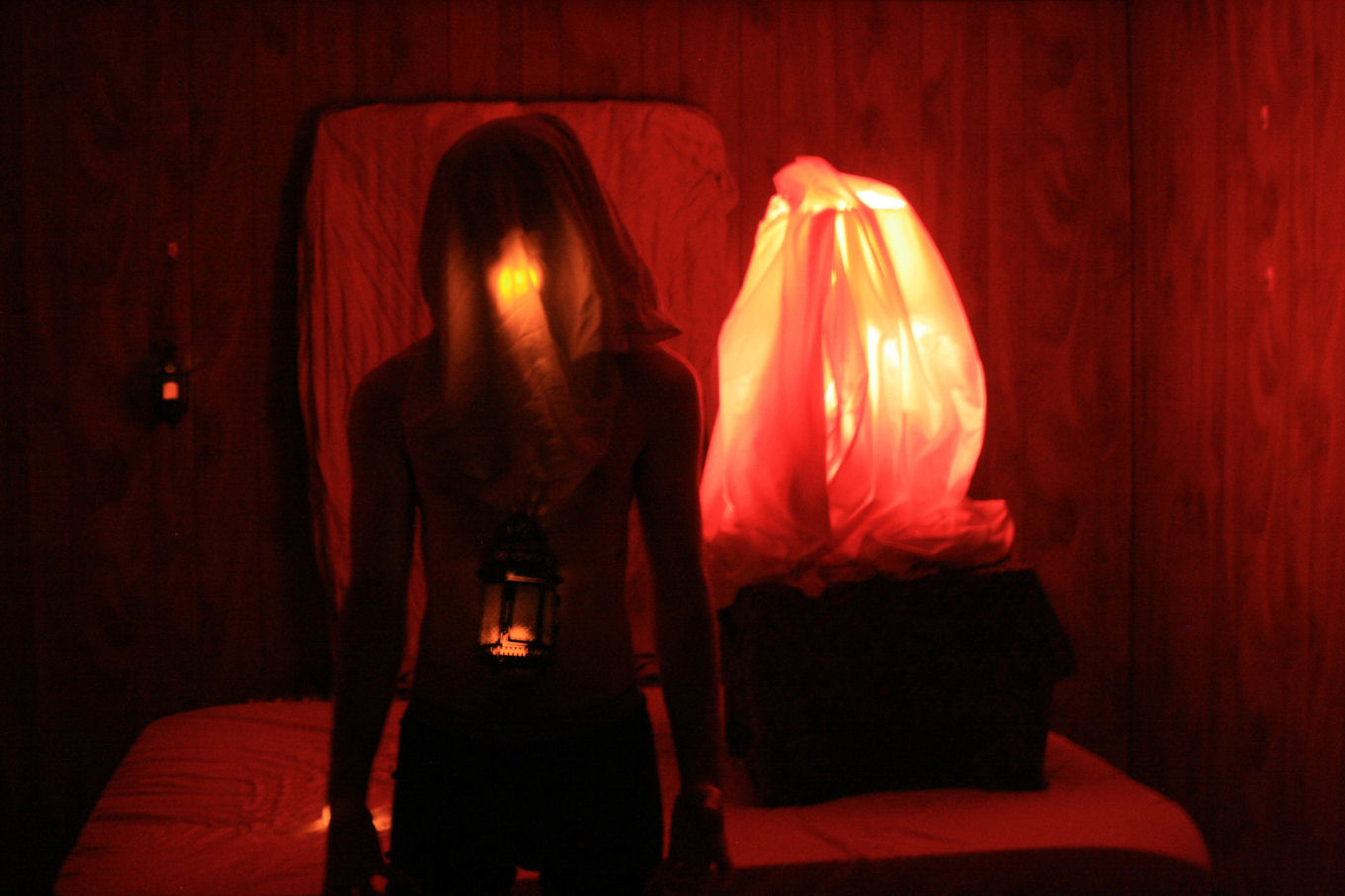
Courage is actually a supremely rare trait to HEAR in music. Not only is the audible-quality that makes up that feeling hard to find – but to be able to discuss the tougher events with these incredible lyricists and storytellers can prove to be even more difficult even in the most comfortable situations.
That’s not the case today.
When I first heard the music of The Last Surrealist, I knew at first instant we’d have much to discuss. Listening to the latest release called Post Life Music…I was blown away by just how personal and sometimes cutting this album could get. From personal-tragedy to personal-insights – this is an album that is lined with emotion.
It’s raw. It’s real.
It took courage to make this album.
Talking with Chris through this interview was incredible. I don’t want to say that simply because of how parallel our lives seem to be…I’m not saying this was awesome cause it was like talking music with myself…but maybe kinda?
It would certainly seem that both Chris and I suffer from that same horrible disease I call “thinking too damn much,” or at the very least we’re consumed by thoughts that generally aren’t shared as commonly as once I had thought. However, by contrast – I’ve often felt isolated & alone…and finding others out there like Chris with a similar thought process can be a very comforting thing.
Because we’re not alone…we’re just scattered.
Those similarities between us wouldn’t stop simply at the station of our thought-process. From the creation of Chris’ latest album, the use of music as our freest & true-form of communication, where our support does/doesn’t come from…to the way we choose to escape it all and just say ‘fuck it’ sometimes…I identified heavily with so much of what Chris has to say in this interview.
For what it’s worth…and as much as a person CAN connect to another through the internet…I really felt like what we talked about really transcended through the music and right into subjects that are as real as life can get.
And no matter how alone or isolated we might ever feel personally, any of us, through music we’re all in this together.
– Jer @ SBS
Interview with Chris Romans of The Last Surrealist
SBS: Chris! Thank you so much for joining us here in print at the homepage and taking some time to talk to us! You’ll have to forgive me…I’ve been listening and learning about The Last Surrealist for the past couple days and I’m EXCITED my man! You seem to be making music with true thought put into it; I found the songs on your latest album Post Life Music to really be dramatic, artistic and unique while I listened and prepared this interview – and what can I say but that I appreciate those attributes in music!
Of course – I also read everything that I could find as well. Post Life Music is interesting for me in the sense that I felt a large personal comparison in the writing of this album. You see, recently I had put out a solo album of my own…but to be truthful…as much ‘fun’ as it was to be making the music entirely on my own again…my album was nearly miserable. But you know Chris – I was OK with that for a singular reason; I wanted to turn my brain as far off as I could and let come out what might as naturally as it could. There were things inside of me that I NEEDED to get out…if I was going to continue making music at all, I needed these things out of me to move on. My own latest album served as a necessary step for me to be able to continue at all.
And from what I can read – with the personal tragedy that you’ve largely had to deal with while making this album…that the case may have been the same for you. Would that be fair to say Chris? I’m wondering if you can give us some insight into the difference between making music born from something inside of you and trying to escape as opposed to what you’ve experienced in songwriting outside of the personal demons that can dominate an artist’s thoughts and work?
Chris: I appreciate the energy you have pumped into developing this interview. This is a really solid and complex question. I think the major difference for me is comparable to the constant conflict in philosophy these days between the camp of people who are more inclined to accept their emotions and personal experiences as real driving forces in the universe, and on the other side we have empirical scientists who try to remove the personal experience in exchange for objectivity. I think they both have their merits. Academically, I’ve studied on both sides of the coin. And personally, I went from believing rigidly that objective studies were the only way to arrive at the truth about anything, to learning that there is a real benefit to accepting one’s emotions, weaknesses, and subjective experiences as beneficial and perhaps a representation of “reality” in it’s truest form.
With songwriting, my personal conflicts and the external motivating forces often overlap. My memories flicker back to certain events in my life that depress me. But while these singular moments in time are memorable and, at least to me, horrible; what really keeps me up at night are philosophical questions. For instance, I often wonder about the nature of beauty. It’s hardly tangible. I try to recreate what I believe to be beautiful in my music. It’s got the external motivators. My music is not devoid of “musical knowledge.” Each note is intentional (spare some improvised segments). The compositions are structured. But it’s also immensely personal. While it fits into a structured universe, I am able to play with the tones and textures to develop something that sounds a little different. That sounds beautiful to me. That sounds almost chaotic as it moves from one track to the next.
The same thoughts carry over to topics such as love and death. I struggle to define the former, and with the latter I often find myself obsessed. At some points, it is an obsession with the dark side of death (so to speak). With depression and the eventual suicidality that comes paired with it for me. But on the flip side, I’ve been slowing moving towards a sort of Hindu or Buddhist perception of the world. I think this allows me to accept my nihilistic tendencies, yet the religious iconography is different, and somewhat uplifting, even if the concept of death is mutated into the idea of rebirth and an eventual merging with a universal consciousness.
SBS: Personally – I think this album works extremely well. I like the diversity, I can appreciate the themes and the music is incredibly inventive and changes beautifully. Would you say that Post Life Music was able to bring you the closure you needed? What exactly will the release of this album help you accomplish on a personal level and how is it able to do that?
Chris: By the last few months, it started to bring out some really intense emotions in me. I don’t think I expressed them too heavily to the people around me, but I certainly felt them. In a personal way, Post Life Music is a representation of an internal struggle I have had for quite a while as it relates to the death of my sister. It has allowed me to find a way of expressing feelings I infrequently have been able to. It is my intention to move away from her passing thematically, at least in a straightforward manner, and go towards a light (or darkness); whichever I prefer.
SBS: “Rebirth In A Nebula” and “To Kiss My Beloved With Eyes Wide Shut” sounded very connected to me when listening through your album the first time. After several listens, of course I started to hear more common threads between them all. Not sure what it was really…but “Rebirth In A Nebula” almost seemed like the beginning of the second chapter of the music to me… Do the tales on the album as it’s laid out follow a sort of autobiographical sequence? In the final layout of the songs on Post Life Music…what determined the order of those tracks and how did it serve to tell your story this way?
Chris: Excellent question and very perceptive of you. “Rebirth in a Nebula” is essentially a movement towards the second phase of the album. The first few tracks are rather accessible as far as I am concerned. Or well, accessible as far as singing about suicide and nihilism can be accessible. But in the least, in terms of the structure and the tones, a track like “In the Morning Our Bodies Will Be Nothing” and “The Gun is Perched Between My Teeth” are fairly easy to get into. “Rebirth in a Nebula” is a calm before the storm. It also sits as a highly atmospheric and almost removed piece of music embedded in this musical journey.
I would not say the album track sequence is “autobiographical” per say, but rather philosophical in it’s movements. It showcases the ebb and flow of my emotional state. From the dark and depressing to the light and melancholy, then back again to the really dark and grimy, then encapsulating what I conceive of to be a sense of rebirth in the final track. It is simply an emotional movement, and I’d argue mature for music in general, which so often is overbearing with one emotion or another. I love making the comparison to standard black metal, which tends to emphasize nihilism, death, misanthrope, suicide, and other related topics with almost bitter exclusivity. I like these topics because they are personal to my way of thinking, but I also think most human beings want to escape these thoughts, even if it is for a moment. By putting these topics on display then subverting them with melancholy and one may even argue a sense of happiness, it makes those emotions even more real.
SBS: Another thing that caught my ear and eyes was the presence of everlasting love on this record…the concept of specifically I suppose… And I found that interesting in several ways really…I’m always interested in the lighter contrasts against the dark in a musical aspect. I can certainly hear that the perception of your sound overall would typically be defined as “darker” stuff…at least on this particular record. But despite many of the desolate characters in the songs and heavy themes accompanied by emotional, dramatic and theatrical delivery…there are large themes of love & hope. Perhaps second chances to correct past mistakes. I’m wandering here Chris…but there’s a question in here somewhere and you’re also interested in philosophy, so hopefully there’s a ball you can run with here somewhere…hmmm… I guess what I want to know are two things…
First I want to know if you believe that it’s more challenging to get across positive themes in a darker musical setting…and secondly, I’d want to know if this move, however it was made, was it a conscious choice? From what I can gather from the music and the intense way it’s layered out – it’s music that should have some time spent on it…I’d assume you’d almost want people to dig a little deeper here to get the full meanings…but that’s always a fine line to walk as well when trying to put your music out there to the people…
Chris: You are really hitting the nail on the head so to speak. On your first question, I do think it is challenging to get across the “positive themes” in this music. My mind isn’t overly inclined to think positively. I am a pessimist in most respects, and the only positives I find in life are strictly personal. I don’t give a fuck about science, religion, social settings, etc. I consider most of the things we do (myself included) to be a façade that we have to hide beneath until the day we die. Music is a form of escapism in it’s purest form. I often get drunk in my home and start recording. Some vocal tracks on this record, most notably on “To Kiss My Beloved With Eyes Wide Shut” were recorded under the influence. And it is better for it. Because that physical consumption of alcohol manifests in the mind as emotion. Alcohol is a depressant after all, and while in the day-to-day I try to move towards a steady equilibrium between happiness and depression (what I simply call melancholia), it can be used to great effect.
The move was a conscious choice. I wanted Post Life Music to be something different than the norm. I think it has a heavy relationship with the black metal sub-genre DSBM (depressive suicidal black metal) in theme, but I move forward out of the grime and dirt, and perhaps even the childish mentality that comes paired with the waling screams of torment in that music, and try to capture something a little different. This makes the album difficult to market though, as I think it loses it’s power if people aren’t engaged enough to read about it, check out the lyrics, or spend the hour listening.
SBS: In regards to ‘love’ in general – there was also a line from your page at Bandcamp that stood out to me significantly and truly made me stop and think for a moment: “Love is a slave to death.”
I have to admit…I’m not so sure. At first instant – I completely agreed. But if you go on to read the rest of that same paragraph containing that quote, that’s where my doubt of this concept came into being – from you. I started to think about this album long and hard…about all the feelings surrounding the death of your sister interwoven into the fabric of these songs…and about how much you obviously loved her then…and STILL. That love…Chris…it still exists in you today, even though she herself is gone. And perhaps when you go one day yourself, maybe then the statement becomes true…I’m not quite sure…but I’m certainly not out to poke holes in your theory or even remotely prove you wrong…just looking for a further glimpse into this statement and what it truly means to you…
Chris: I appreciate your openness in asking this question, as I imagine most interviewers would bypass something that truly could be viewed as a “difficult question.”
You are highly accurate in your interpretation of my thoughts. While I’m not clinically bipolar, a lot of my personal philosophies have a tendency to be. I think this runs parallel with my medical condition (I have depression by clinical standards). Some days all I really see is the dark. Some days all I want to do is drink. Some days I wallow in sadness. Other days I just get by but have “average” days. And on other occasions, though they tend to be more rare, I have genuinely good days wherein I enjoy being alive.
For me, concepts like “love” and “death” are not concrete. They are abstractions of reality. In a sense, this is what music is to me as well, an abstraction of my feelings. It captures a glimpse of myself in time. Seeing as I worked on Post Life Music for a little over a year, it captures my essence over this course of time, and when I listen to it now in it’s complete state I get the opportunity to listen to that segment of my life played out artistically. The way my mind works is it so often construes abstract terms like “love” in a number of different ways. When I say “love is a slave to death,” sometimes I mean it literally, almost as if this thing we call love is in shackles and chains held by this thing we call death. More figuratively, within my own worldview that is closely related to a mixture of atheism, nihilism (which I consider the true end result of atheism), and Buddhism; love will without a doubt die as an emotion and an experience when I die. Just like my physical body will die, and likely my mind and spirit if those things really exist.
The real kicker here though is this: Love as a slave to death does not have to be a negative thing. In the same way, “Post Life Music” does not have to be negative, though on the surface it may sound rather negative given my relationship with DSBM, my own depression and suicidal tendencies, and so on. Post Life Music (as I’ve come to call it) should be something for everyone. If other artists were to make music in this style, it should be a representation of what they view an after-life to be like. For a Christian, maybe this is some representation of meeting a god and living in Heaven. I’m not offended by that as it is a personal experience. But for me, the “post life” is truly nothing. Or at best, in this moment, a dream of something that is not there. A dream to see my sister again. A dream to take back memories of kissing her forehead in her casket. And a dream of other things like continuing friendships and my relationship with my girlfriend. Indeed, my depression stems predominately from the conflict of wanting these things in face of what I consider to be reality that none of these things will happen at all because death is all encompassing. In some way, it is all beautiful none the less, I think because it is all so temporal and futile.
SBS: Does that particular statement come into play at all during the song “Love Is Subservient To Death?” Cause I gotta say brother-man – that is one absolutely killer track. I absolutely love it.
I also know from briefly chatting with you prior to this interview that you’re 100% DIY. I hear a track like this – one that displays true atmospheric brilliance and is honestly phenomenally beautiful…and I know I’m not alone in wondering where a track like this gets started…how does it come to life? There are amazing ideas on display through every instrument and the vocals as well…let us in on your process Chris…take us through the creation of a track as epic as this…please!
Chris: I don’t say “Love is a slave to death” during that track, however it’s theme is ever present as the track title is simply another way of stating the same phrase. If you were to check out the lyrics, you will find that the track plays out in two segments, with a majority of the lines repeating. However, in the first section of the song I sing, “Nothing but love exists,” yet erase this thought entirely in the second section where I replace it with, “Even love is a facade. Nothing but death exists.” Unfortunately, I imagine most who interpret this song will, again, view it in a pessimistic light. As if love is replaced by death. It is not. Love is just a slave. But slaves exist and have value. Not just by their owners, but they find it within themselves as well. Love is my slave. I have found love and made it mine. I consider my first love my deceased sister, but I love other people and concepts as well.
As it is, I’m glad you like the track. It’s one of my favorites as well. You are correct that I do everything myself. “Love is Subservient to Death” started as just a disjointed arpeggio on my acoustic guitar. Then I started adding layers (as I tend to), and found myself listening to Clint Mansell’s soundtrack to the film The Fountain heavily during the time of writing it. It’s got a similar atmosphere, though I think is different enough to be beautiful in it’s own right. After I created the structure with the synth tones and orchestral component, I went through and devised an acoustic guitar segment towards the end, and created an improvised acoustic bass line that plays through the entire track. The vocals feature Auto-Tune, which I use for the effect more than adjusting my always imperfect vocals. Considering my mediocre equipment, this is a track I’d ultimately say I just got lucky with.
SBS: Clearly getting many of the personal issues surrounding your life out onto these recordings became a necessary step…almost survival-instinct if you were to ask me… Now that they’re out there fully recorded – do you feel like you’ve been set free somewhat? At least on a musical level…this might just give you the freedom you’re searching for to explore new territory for that next record would it not? Any predictions on where the future sounds of your own music might go?
Chris: Absolutely. I found some sense of relief and freedom in creating this album. In the past few months, it became very tiring as I am not usually one to dwell on single tracks for too long. In fact, my previous EP release VOID was put together very quickly. I didn’t spend much time mixing or mastering. I didn’t care all that much. With Post Life Music, I found myself caring too much. With work and a steady stream of things to be done in my regular life, it was difficult to finish. I know I have limits though. I’m not an expert producer. My equipment and environment only allows for so much. But I think it came out well.
I’m not certain where I am going musically yet. I’m considering doing a few stripped down, acoustic tracks; but I have an unhealthy obsession with layers and textures, it’s hard to keep me away from synths.
SBS: I would also imagine there’s an extremely fine line as well when showing these songs to those closest to you; you’d want to communicate what you’ve chosen as a therapeutic way of dealing with these issues in life – but many of the heavy themes and vocals could certainly incite some worry in people that might not fully get the concept…you know what I mean? It’s a record that certainly communicates the pain you’ve gone through…but how do you keep the friends and family from worrying? Do they get it all as clearly as you do? Where does your musical support come from?
Chris: I don’t get a lot of musical support. I keep it hidden away from the majority of my family. Not because I don’t want to share per say, but because the manner in which I express myself at face value can be construed in a very negative way. From the words I say like “piss, shit, and fuck” to talking about killing myself so openly would not go over well with my predominately conservative parents. It doesn’t help that I got into some bad shit a little over a year ago and ended up in a psych ward because of it. It’s all complicated to say the least. Most of the support is internal and motivated by my poor sense of direction. I view the creation of music as a method of talking. Like a different language. I can speak to myself with it, and now I’d like to use it to talk with others. It helps broach difficult topics that society as a whole tends to hide away from or glamorize to escape it in plain sight. This is self-evident with death. We hide from it so much. I’ve kept many emotions and words in my mouth pertaining to my sister, but now I speak so openly because honesty is the greatest virtue for me. To be honest with oneself and acknowledge that I am human, filled with insecurities and imperfections, and others around me are in the same boat. And we’re going to die like my sister did so suddenly in a freak accident.
SBS: Have to admit…”Her Morning Breath…” you’re just NAILING it for me there brother! Again, densely-deep atmosphere you could physically cut and guitar that is just astoundingly beautiful. It got me thinking…this guy certainly has a connection with that particular instrument in general…like you’ve been playing guitar longer than the rest of your musical arsenal… Is that the case? What instrument did you first learn and what instruments do you feel you can play and hold your own on now?
Chris: Guitar was my first instrument as you can probably tell. I am moderately skilled at it, though I typically only play when I’m working music. It’s a means to an end. The same goes with any other instrument. I am not overly competent with most. I can play piano with moderate proficiency, but I’m no classical artist. I have other random instruments around the house like the piano, flute, violin, didgeridoo, etc. I just like a lot of different sounds, even if I can’t play them all that well. My real specialty is sequencing. Most of the synth, orchestral, and drum tones throughout the album are programmed. I take what musical knowledge I have from learning guitar and utilize it in the construction of these digital sounds.
SBS: “I Am Become Death.” The minute I heard that famous quote from J. Robert Oppenheimer I knew I’d want to know more about the track it’s found in called “When A Ghost Embraced The Dust.” On a side-note…dude, you have got a real kick-ass way of really nailing titles for your songs…each one made me really want to know the story and sounds behind them…but I digress…
Certainly there are unlimited quotations out there that could have been mined through to use in one of the nine songs to make up your album…but this resonated with you hard enough in there to include it in your music. I’m supposing you’ve drawn a personal-parallel between this historical and horrific event surrounding the Oppenheimer quote…or perhaps it simply stands alone thematically…
But I mislead no one; I have the intelligence of a fourth-grader. Not even the smart one – probably the one nose-picking at the back of the class… So lay it out for me real easy-like Chris…tell me about how this quote found its way onto the album and how it resonates with you personally?
Chris: “When a Ghost Embraced the Dust” is a track I’ve come to call “a death trance.” It’s repetitive and drone oriented. It’s genuinely trance music by it’s formal definition (I think). It’s got the pulsing beat and seems to go on forever. But when it gets to that sample of Oppenheimer, the music changes. Thematically, this is how I view life in general until those pivotal moments that change us. We go from working, droning, and doing the mundane over and over; then our friends die, our family members die, or we get a new job and are temporarily made happy for a moment, or some other memorable event passes us by and changes us. With the atomic bomb creation, I expect this is what it must have felt for the crew behind it. He says, “I knew the world would not be the same.” This is a pivotal point in the history of man. We now have the power to destroy ourselves in the blink of an eye. On a more personal note, I was also impressed by his analogy to the Hindu scripture the Bhagavad Gita. Something is lovely about the idea of a god of death. It interacts with my amusement by religion and philosophy and plays off the theme of death and dying throughout the album very well.
SBS: Now…I don’t want to start a fight between us here Chris…so I’m gonna tread lightly here…or as lightly as I can with this next question…
You SAID on YOUR bandcamp page…and I QUOTE…
“All this shit is meaningless. And I love it because of this.”
I mean DUDE…you’re damn near INVALIDATING my ENTIRE EXISTENCE here as a guy that NEEDS people like YOU out there making NEW and exciting music for me to listen to. I’m serious as a heart attack brother. If we weren’t doing this interview RIGHT NOW I could be lying face down in a DITCH somewhere…who knows? They say one man’s junk is another man’s treasure but this couldn’t have been the intent of that famous quote! Music means EVERYTHING to me.
Christopher… (said in an unwarranted & thoroughly unnecessary parental tone…) – explain this to me dammit!
Chris: As I am a nihilist in nature, I consider the end result of all things to be devoid of value and purpose. At least, objectively speaking. Sure, we can find things for ourselves to do. Find value in our loved ones for instant. But it’s all temporary. I think that is the real sentiment I would like to get across via that quote, though it’s obviously cryptic. I suppose another way of wording it would be like this: “All this shit is ultimately meaningless, but I love the nature of this temporary existence.” Or something like that. I’m not the best poet when it comes to revising my own work, I will not lie.
One thing people can learn about me in this moment is that I often will say things just because it is absurd or I think it will illicit an interesting response from people. As you can see, I have accomplished this with the former statement. Conversation is something I enjoy, and I’m glad to have this one with you.
SBS: Whoa! Sorry brother! I’m just a passionate guy who needs to know why people do what they do! I’ll lighten this up a bit as we head towards the end… Tell me about what goals you might have for yourself and your music in this next decade to come. What will continue to drive you forward and is there any kind of end-goal in mind overall? Where is that line of ‘success’ for you personally in making music through The Last Surrealist?
Chris: I take everything I do in life one step at a time. I have no real goal, because I don’t really like the prospect of goals and what they suggest of this existence. Given that everything is temporary. I could die tonight in my sleep and the universe wouldn’t blink for a second. When I consider myself amongst the billions of other people and animals inhabiting the planet, I am not important at all. And that is okay with me. But, I’d like to think that art has the prospect of being more than the individual who creates it. So while I don’t have goals for this project, I have no intention of stopping the development of music, as I enjoy it. Moreover, defining success is tough as I work in a difficult to pin down (and therefore: market) genre. I guess I could ask myself one thing when I finish a record: does it satisfy me? For Post Life Music, the answer is “yes.” Will others enjoy it, I will let them be the critics.
SBS: Bleh. How’s this SHIT for an original question…sorry Chris…it’s a standard but we GOTTA do it… Let’s get those websites from ya brother-man…where can the people find you and what will they find there? How often are you reaching out through these online social media platforms? I’m cool with losing the creativity points in this interview to get a few more people to those pages of yours!
Chris: Haha. I’ll allow it. I am most active via Bandcamp and SoundCloud. I highly enjoy feedback, even if it’s critical, just try not to be too much of an elitist dick.
http://thelastsurrealist.bandcamp.com/
https://soundcloud.com/thehorizonofadream
SBS: Chris I want to thank you SO MUCH for this interview – it was really cool digging into all the details of making Post Life Music and truly, thank you for discussing everything so out in the open. It’s my personal hope that genuine people like yourself never lose that ability to connect and communicate as they continue through their careers…but I get a true sense that I really don’t need to worry about you at all. As dark as that album can go at times…I hear enough light in there to know you’re gonna be ok – you’ll come out of all this even stronger. This I know…all too well.
I’d like to invite you to say ANYTHING at all you’d like in this final space. Anything you wanted to talk about that I didn’t get to, or anything that comes to mind at all.
My friend – I wish you all the best. Thank you again for this tremendous opportunity to speak to you about your music.
Chris: I highly appreciate your time and effort in this interview. It was complex, challenging, and somewhat beautiful to be able to coerce on a platform like this. If I can say anything it is this, for people who enjoy (or despise) my music, there is always an open door to contact me via email or social media. I respond to all messages and just like passing conversation too. Be it about music, philosophy, or some other senseless thing.
We’ve got questions, you’ve got answers – be our next interview guest at sleepingbagstudios by clicking here!


